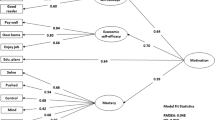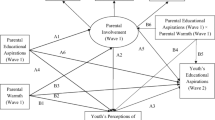Abstract
Past research on adolescent attainment has virtually ignored the interactional aspects through which children learn attainment values. Using a simulated career game, parent-child interaction (father, mother, and adolescent son or daughter) was coded to assess its impact on the child's attainment value. Encouragement patterns, parental opportunity awareness, and family affect were examined. Results revealed differences in these family interaction variables as sources and determinants of adolescent attainment value, depending upon sex of child. The variables were able to account for considerably more of the variation in sons' attainment value than daughters'.
Similar content being viewed by others
References
Alexander, K. L., & Eckland, B. K. Sex differences in the educational attainment process. American Sociological Review, 1974, 39(October), 668–682.
Barnett, R. C., & Baruch, G. K. The competent woman: Perspectives on development. New York: Irvington Publishers, 1978.
Baumrind, D. Socialization determinants of personal agency. Paper presented at the biennial meeting of the Society for Research in Child Development, New Orleans, 1977.
Binderman, M. B. The failure of freedom of choice: Decision-making in a southern Black community. Social Forces, 1972, 50(June), 487–498.
Blau, P., & Duncan, O. D. The American occupational structure. New York: Wiley, 1967.
Bordua, D. Educational aspirations and parental stress on college. Social Forces, 1960, 38 (March), 262–269.
Crandall, V. J., Dewey, R., Katkovsky, W., & Preston, A. Parents' attitudes and behaviors and grade-school children's academic achievements. Journal of Genetic Psychology, 1964, 104, 53–66.
Duncan, O. D., Featherman, D. L., & Duncan, B. Socioeconomic background and achievement. New York: Seminar Press, 1972.
Dynes, R., Clark, A. C., & Dinitz, S. Levels of occupational aspiration: Some aspects of family experience as a variable. American Sociological Review, 19 21(April), 212–215.
Haller, A. O., & Miller, E. W. The Occupational Aspiration Scale: Theory, structure and correlates. Cambridge, Mass.: Schenkman, 1971.
Hurley, J. R. Parental malevolence and children's intelligence. Journal of Consulting Psychology, 1967, 31, 199–204.
Ihinger, M. Attainment values and parental value transmission. Unpublished doctoral dissertation, University of Minnesota, 1977.
Kahl, J. A. Educational and occupational aspirations of “common man” boys. Harvard Educational Review, 1953, 23(Summer), 186–203.
Kahl, J. A. Some measurements of achievement orientation. American Journal of Sociology, 1965, 70(May), 669–681.
Katkovsky, W., Crandall, V. C., & Good, S. Parental antecedents of children's beliefs in internal-external control of reinforcements in intellectual achievement situations. Child Development, 1967, 38, 765–776.
Kerckhoff, A. Ambition and attainment: A study of four samples of American boys. Rose Monograph Series (American Sociological Association), 1974.
Kuhn, A. The logic of social systems. San Francisco: Jossey-Bass, 1974.
Leik, R. K., & Tallman, I. Chronic imminence: In some people it is more rational to wait. Paper presented at the meeting of the Pacific Sociological Association, San Diego, March 1976.
Lipsit, S., Bendix, R., & Malm, F. T. Job plans and entry into the labor market. Social Forces, 1955, 33(March), 224–232.
Lynn, D. The father: His role in child development. Monterey, Calif.: Brooks/Cole, 1974.
Maccoby, E. E. (ed.). The development of sex differences. Stanford: Stanford University Press, 1966.
Mandle, J. D. Women and social change in America. Princeton, N. J.: Princeton Book Company, 1979.
Mannino, F. V. Family factors related to school persistence. Journal of Educational Sociology, 1962, 35(January), 193–202.
Morrow, W. R., & Wilson, R. C. Family relations of bright high-achieving and under-achieving high school boys. Child Development, 1961, 32(September), 501–510.
Rehberg, R., & Westby, D. Parental encouragement on education, and family size. Artifactual or independent determinants of adolescent educational expectations? Social Forces, 1967, 45(March), 362–374.
Romaine, M. F. Parental cognitive modes and teaching style with preschool children. Dissertation Abstracts International, 1970, 31(4), 1694A.
Rosen, B., & Aneshensel, C. Sex differences in the education-occupational expectation process. Social Forces, 1978, 51(September), 164–185.
Rushing, W. Adolescent-parent relationship and mobility aspirations. Social Forces, 1964, 43(December), 156–166.
Sewell, W., Haller, A. O., & Portes, A. The educational and early occupational attainment process. American Sociological Review, 1969, 34(February), 82–92.
Sewell, W., & Hauser, R. Education, occupation, and earnings: Achievement in the early career. New York: Academic Press, 1975.
Sewell, W., & Shah, V. P. Parents' education and children's educational aspirations and achievements. American Sociological Review, 1968, 33(April), 191–209. (a)
Sewell, W., & Shah, V. P. Social class, parental encouragement, and educational aspirations. American Journal of Sociology, 1968, 73(March), 559–572.
Tallman, I., & Wilson, L. “Simulating Social Structures: The Use of a Simulation Game in Cross-National Research” Simulations and Games, 1974, 5(June), 147–167.
Tallman, I., Wilson, L., & Straus, M. A. SIMCAR: A game simulation method for cross-national family research. Social Science Information, 1974, 13(April), 121–144.
Vigod, Z. The relationship between occupational choice and parental occupation. Alberta Journal of Educational Research, 1972, 18(December), 287–294.
Author information
Authors and Affiliations
Additional information
This study was made possible by grants from the National Institute of Mental Health (#15521-04), the Midwest Universities Consortium for International Activities (MUCIA) (*G-75), and the Minnesota Center for Comparative Studies in Technological Development and Social Change (funds provided by the Ford Foundation) (#26301), principal investigator, Irving Tallman. The author would like to acknowledge the helpful comments made by Viktor Gecas, Jeylan Mortimer, Irving Tallman, and especially Milton Rokeach on an earlier draft of this article.
Rights and permissions
About this article
Cite this article
Ihinger-Tallman, M. Family interaction, gender, and status attainment value. Sex Roles 8, 543–556 (1982). https://doi.org/10.1007/BF00287718
Issue Date:
DOI: https://doi.org/10.1007/BF00287718




